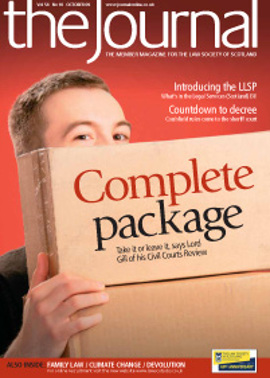Where privacy prevails

Fresh evidence again
Opinions are now to hand in two fresh evidence appeals, each with a different outcome. In McCreight v HM Advocate [2009] HCJAC 69, the appeal succeeded; indeed the conviction was quashed back in April, when the court also refused a Crown motion to allow a retrial. Full reasons have now become available and they make interesting reading, not least because of the nature and quality of the fresh evidence itself. The appellant had been convicted of murder, after the jury accepted the Crown case that he had poisoned his victim by placing chloroform at her mouth and nose, causing her to inhale the same and thereafter, when she was unconscious, failing to get medical assistance for her and leaving her to die in the garden of a nearby house. In so doing, the jury rejected the defence hypothesis that the victim had died as a result of ingesting the chloroform, rather than by inhaling it.
It subsequently transpired that much of the scientific evidence presented at the trial with respect to the possibility of ingestion had been, to quote the appeal court, “erroneous as a matter of science, carried the flavour of bias when seen in the context of the totality of the scientific evidence and was seriously misleading on a critical matter for consideration by the jury”. Perhaps the most serious flaw was that the deceased’s liver was not analysed for chloroform until after the trial started and the calculation itself turned out to have been botched.
Having heard fresh evidence froma number of eminent scientists in forensic pathology, toxicology and chemistry, along with further evidence from the scientists who had originally given evidence, the court concluded that the conviction could not stand.
As to the law, the Crown conceded that there was a reasonable explanation why the fresh evidence was not heard at the original trial, as required by s 106(3A) of the 1995 Act. As for the other relevant subsections, the requirements of a reasonable explanation and support by independent evidence were also met. But what made the case unique was that there was no issue about the credibility and reliability of the witnesses heard by the appeal court; since that was so, the only issue was whether the evidence was likely to have had a material bearing on, or a material part to play in, the determination by the jury of the critical issue at the trial. Since it was clear that the original trial would have been conducted on a different basis by both sides had the true facts been known, a miscarriage of justice had occurred.
The other fresh evidence case was White v HM Advocate [2009] HCJAC 72 (18 August 2009), where the appeal was firmly rejected, although the Crown had again conceded that the “reasonable explanation” test had been met. The appellant had been convicted of assault to severe injury and permanent disfigurement. He appealed originally on two grounds: (a) that the sheriff had been wrong to repel a submission of no case to answer; and (b) alleged misdirection of the jury. He obtained interim liberation and some months later encountered a taxi driver who said he had been driving at or near the locus when the major part of the assault occurred. The driver said he was sure the crime was not committed by the appellant, but by another named individual.
On this basis the appellant was permitted to lodge a fresh evidence ground of appeal, following which the High Court heard the evidence of the taxi driver, the appellant and the third person. Unlike the latter, who claimed he had nothing to do with the crime, the former two were not regarded as credible witnesses; accordingly the test in s 106(3)-(3D) of the 1995 Act was not met and the appeal was refused on both the fresh evidence and original grounds.
Disclosure of previous convictions
The Privy Council has now ruled on one of the outstanding issues of the disclosure regime: the extent of the Crown’s duty in respect of previous convictions of Crown witnesses.
The case of HM Advocate v Murtagh
(3 August 2009, Privy Council
Appeal no 11 of 2009) had reached the Judicial Committee by way of reference from the High Court, which in turn had been considering a Crown appeal against the decision made at a first diet in Glasgow Sheriff Court.
It was in connection with a pending case of serious assault that the sheriff had granted commission and diligence for the recovery of documents showing the criminal records and/or pending charges in respect of five Crown witnesses and an incriminee, but the order was not qualified by reference to the relevance or materiality of the convictions or charges. This led to a Crown appeal and the lodging of devolution issues by both sides. In due course the Advocate General intervened and it was at his instance that the High Court referred the case to the Privy Council.
The general duty of disclosure was not in issue, but rather the question was whether, as a consequence of that duty, the witness’s entire criminal history had to be disclosed or only such part or parts of it as were material; and if it was the latter, who was to decide the issue of materiality. These points constituted the kernel of the reference, which of course was drafted with reference to the European Convention and also included a question whether article 6(1) required disclosure of fiscals’ warnings or measures offered and accepted as alternatives to prosecution, such as fixed penalties.
Both European and Scottish lines of authority (starting with Edwards v United Kingdom (1992) 15 EHRR 417 and extending through to McDonald v HM Advocate 2008 SLT 993) make it clear that the duty on the prosecution is to disclose all material evidence in its possession for and against the accused, a position which is likely to be given statutory effect if ss 89 and 90 of the current Criminal Justice and Licensing (Scotland) Bill are enacted. But McDonald left open the question of how far the Crown was obliged to go in the case of previous convictions and outstanding charges.
Article 8 issues arose; having heard argument, the Judicial Committee decided that information of that kind stored in official police records fell within the private life of the person concerned, thus engaging his article 8(1) right. Accordingly, release of that information would be incompatible with the Convention unless justified under article 8(2); and this in turn raised the issue of how to balance the absolute right of the accused under article 6(1) to a fair trial.
The Privy Council concluded that the release of the entire criminal history of a witness (without regard to its materiality) would go too far; to do so would be arbitrary, since no legitimate purpose would be served by the release of information which was not material. Materiality depended on whether the information could have any possible bearing on the witness’s credibility or character; and only the Crown could make the initial decision on materiality. In the case of a dispute between the parties about that issue, a simple procedure ought to be adopted whereby the court could resolve the problem. In the case of alternatives to prosecution, the materiality principle would also apply, although in many cases the relative offence would be trivial and of no materiality at all.
De recenti statements
What happens if the making of a de recenti statement by a rape victim is spoken to in evidence by the person who heard it, but the complainer said to have made the statement denies in her evidence having made it? Is the evidence of the person who heard it admissible in law, and if so, how should the trial judge direct the jury? These issues confronted a bench of five judges in Ahmed v HM Advocate [2009] HCJAC 73 (9 September 2009), in which case, unlike MacDonald v HM Advocate 2004 SCCR 100, no objection had been taken to the admission of the statement.
Having reviewed the common law and such other authority as was available on the point, the court decided that there was no logical requirement that the complainer should testify to having made the complaint to which the recipient had spoken; there might be good reason (such as the trauma of the event) for the absence of such evidence. While it was true that the only evidential value of a de recenti statement was to bolster the credibility of the complainer and not to provide corroboration of anything, the primary issue was the credibility and reliability of her evidence as to the attack; the fact that she gave conflicting evidence on other matters (such as the making or otherwise of a de recenti statement) might go to her overall credibility and be a matter of comment to the jury.
In directing the jury that they could have regard to the evidence that a de recenti statement was made, the trial judge had not misdirected the jury. The appeal was dismissed; and the court expressed its disapproval of the view taken in MacDonald that there had to be an “original statement” to which the supporting witness could speak.
Charles Stoddart is a criminal law author and a former sheriff
In this issue
- The Combined Standard Clauses (2009 edition)
- Preserving a legal inheritance: settlement rights in the "Occupied Palestinian Territories"
- The European Court and the duty to investigate deaths
- Chief Executive's SGM address
- Shelter's online resources
- Musical copyright and contract
- The international swap shop
- Headline fortnight
- The Gill Report? What's not to like?
- Solicitor advocates and conflicts of interest
- Settlement in the West Bank
- Package deal
- RoS = economic value
- Defining the future
- Global leader?
- Dog's chance
- Coulsfield rules OK
- Money and your life
- Experts on the case
- At the hub, 10 years on
- Guardians: don't look to the Fund
- From the Brussels office
- Ask Ash
- Making the most of ABS
- Planning for growth
- The perils of posting
- ARTL: friend or foe?
- Where privacy prevails
- How was it for you?
- Agreeing rescues with creditors
- Adopting new solutions
- Divorce for gender change
- Scottish Solicitors' Discipline Tribunal
- Book reviews
- Website review
- A safe pair of hands tops the bill
- Law out of step






